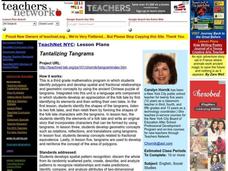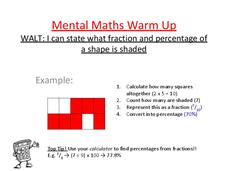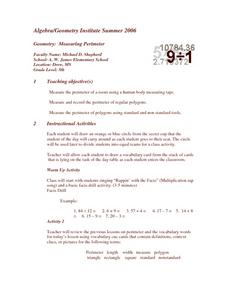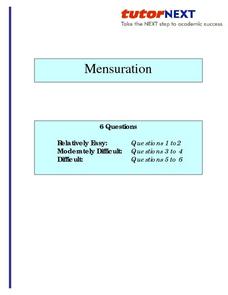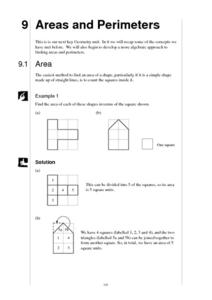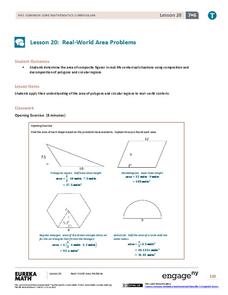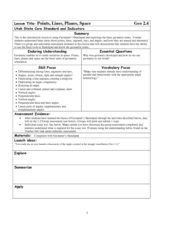Curated OER
Tantalizing Tangrams
Students identify polygons and develop spatial and fractional relationships and geometric concepts by using ancient Chinese puzzle of tangrams. They develop an appreciation of the folktale by identifying its elements and then writing...
Curated OER
May the Force Be With You
Third graders participate in a variety of hands-on activities that involve the effects of force on an object: What a Load, Over the Edge, Collision Zone, and Straw Rocket. They practice describing and comparing attributes of...
Curated OER
Polygons: Angles vs. Sides
Students analyze the relationship between the number of sides of a polygon and the sum of its angles. Pattern blocks are utilized to trace the outside of the shapes. They make their own outline of a four-sided polygon from the replica of...
Curated OER
Circles 1, 2, 3, 4
Here is a way to help your charges identify circles and spheres. In this shapes geometry and technology lesson, students identify and draw circles and explain the related attributes. They recognize circles and spheres while exploring...
Curated OER
Finding Angles, Volume, Area, and Perimeter
Elementary schoolers complete word problems dealing with the different kinds of measurements of different shapes. They solve 10 problems including perimeter, angles, volume, and more.
Curated OER
Mental Math Warmup
The equivalency of fractions, decimals, and percents is the focus of this short, but effective, presentation. Learners view grids of squares that are shaded in varying degrees. They must calculate the fraction, decimal, and percentile...
Curated OER
A Cone and Its Net
Create and investigate nets for solid shapes with your class. They identify the different parts and faces of each polygon and solid then calculate the surface area and volume of cones. They use circle sectors of varying sizes to build...
Curated OER
Measuring Perimeter
Have your class practice measuring the perimeter of various objects using this resource. Fifth graders place various-sized polygons in order (from largest to smallest). They use non-standard measuring tools to estimate the distance...
Curated OER
Mensuration: Area
In this area worksheet, young scholars read story problems, draw diagrams, and find the area of described polygons. This eight page worksheet contains six problems. Answers are provided.
Curated OER
Understanding Visual Fractions
Using fractions as their artistic guide, learners color in parts of five shape images. Each image is segmented based on the denominator, so scholars simply need to apply the numerator to know how much to color. None of these are mixed...
Curated OER
Many Colored Maps
In this map worksheet, 6th graders identify and complete 10 different problems that include various dimensional maps. First, they complete the table on the right by coloring the maps found on the bottom. Then, students determine the...
Richland County School District One
Falling Into Geometry Through Paper Art
New-to-school learners create a fall quilt consisting of three different paper geometric quilt squares. They use various geometric shapes that when assembled will form a scarecrow, pumpkin, and a crow. Assembly will require sorting...
Curated OER
Perfumania
Students identify various geometric shapes. Apply the given formulas to determine the volume of these shapes. Design their own container to conform to specifications provided. Use their knowledge of volume formulas and shapes to compute...
Curated OER
The Square Counting Shortcut
An excellent instructional activity that encourages students to discover how complex figures can be broken into simpler shapes when measuring area. Working with block letters, learners are given the freedom to develop their own...
Illustrative Mathematics
Comparing Snow Cones
Everyone wants to have the biggest snow cone possible, so would that be in cone-shaped cup or a more cylinder-style cup? Hungry geometry juniors compute the volume of each in this practical task.
Centre for Innovation in Mamatics Teaching
Areas and Perimeters
Cover some serious area in your geometry curriculum with this collection of worksheets. After first introducing the concept of area using the tiling method, this resource continues on to teach learners how to use...
EngageNY
Real-World Area Problems
Not all structures take the shape of a polygon. The 21st lesson in a series of 29 shows young mathematicians they can create polygons out of composite shapes. Once they deconstruct the structures, they find the area of the composite figure.
EngageNY
Analyzing Residuals (Part 2)
Learn about patterns in residual plots with an informative math lesson. Two examples make connections between the appearance of a residual plot and whether a linear model is the best model apparent. The problem set and exit ticket...
Curated OER
Dihedral Figures
Middle and high schoolers perform transformations. In this web based lesson, students explore dihedral figures. They use the web tools to translate, rotate, and reflect figures. Pupils identify lines of symmetry.
CPALMS
2D Rotations of Triangles
Where does the line of rotation need to be to get a cone? Pupils respond to three questions involving rotating a right triangle about different lines. The scholars describe the solid created along with providing details about its...
Curated OER
Transformations and Translations in Geometry
In this transformations and translations in Geometry worksheet, learners use geometric shapes and grids to translate six transformations in each of two activities.
Curated OER
Mirror, Mirror
Geometry students use hinged mirrors to discover that the regular polygons are composed of triangles tessellating around a center point. They sketch triangles on paper models of the regular polygons having 3 to 10 sides and compute the...
Curated OER
Evaluating Expressions
In this evaluating expressions worksheet, students solve and complete 50 various types of review problems. First, they complete each sentence and define the listed terms. Then, students evaluate each expression for the given values. They...
Curated OER
Points, Lines, Planes, and Space
In this points, lines, planes, and space worksheet, students solve word problems dealing with points, lines, planes, and space. Students complete 20 individual problems and 20 group problems.
